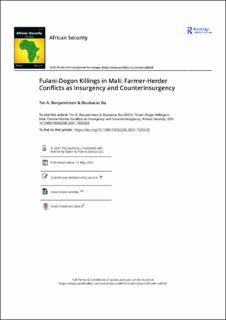| dc.contributor.author | Benjaminsen, Tor A | |
| dc.contributor.author | Ba, Boubacar | |
| dc.date.accessioned | 2022-03-15T12:39:32Z | |
| dc.date.available | 2022-03-15T12:39:32Z | |
| dc.date.created | 2021-06-08T13:16:08Z | |
| dc.date.issued | 2021 | |
| dc.identifier.citation | African Security. 2021, 14 (1), 4-26. | en_US |
| dc.identifier.issn | 1939-2206 | |
| dc.identifier.uri | https://hdl.handle.net/11250/2985276 | |
| dc.description.abstract | Violent clashes between Fulani and Dogon have recently escalated in the Seeno plains in central Mali. After failing to defeat a “jihadist” insurgency dominated by Fulani, the Malian army has sponsored and trained a Dogon militia, which has systematically attacked Fulani villages, and again caused counterattacks. In addition, internal conflicts within Fulani and Dogon society have emerged. This demonstrates the complexities of the current crisis in Mali and how simplistic narratives about its causes are unhelpful. It also shows how views of the enemy as “terrorists” or “jihadists” are dangerous and able to further fuel violent conflicts. | |
| dc.language.iso | eng | en_US |
| dc.title | Fulani-Dogon Killings in Mali: Farmer-Herder Conflicts as Insurgency and Counterinsurgency | en_US |
| dc.type | Journal article | en_US |
| dc.type | Peer reviewed | en_US |
| dc.description.version | publishedVersion | |
| dc.source.pagenumber | 4-26 | en_US |
| dc.source.journal | African Security | en_US |
| dc.identifier.doi | 10.1080/19392206.2021.1925035 | |
| dc.identifier.cristin | 1914517 | |
| cristin.ispublished | true | |
| cristin.fulltext | original | |
| cristin.qualitycode | 1 | |
